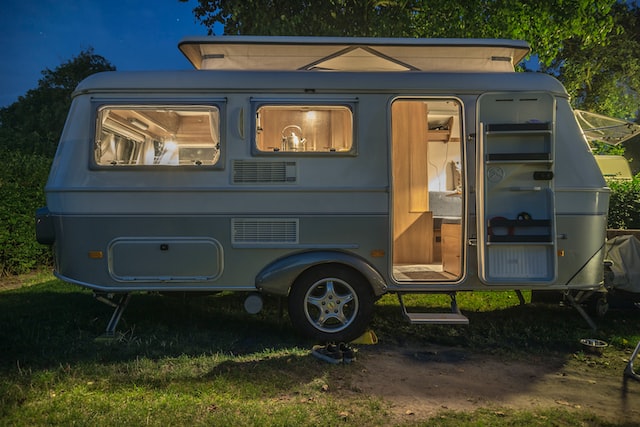 Foto von Kevin Schmid auf Unsplash
Foto von Kevin Schmid auf Unsplash
When it comes to road trips, there’s no better way to explore the world than with a home away from home. Traveling around with your own RV or trailer is an amazing experience that can make any road trip more enjoyable and memorable. With the freedom to go wherever you want, whenever you want, it’s no surprise why so many people choose to take their homes on the road in either an RV or a trailer.
But when you’re trying to decide between an RV and a trailer, it can be hard to know which option is right for you. With so many different types of RVs and trailers available, it can be overwhelming to figure out which one will fit your lifestyle best.
Making the right decision requires understanding all of the advantages and disadvantages of each option, as well as assessing your needs and budget. This article will help guide you through this process by providing an overview of RVs versus trailers so that when you hit the open road, it’s with confidence knowing that your vehicle is perfect for your journey. To help you make an informed decision, here are the most important factors to consider when choosing between a trailer and an RV.
Assess Your Needs
When choosing between a trailer and an RV for your next road trip, it’s important to properly assess your needs. This means taking into account the size of your group, lifestyle preferences, travel style, budget constraints, and any other factors that may influence which type of vehicle is best suited for you.
First, think about the size of your group and the amount of space you’ll need. RVs come in various sizes, ranging from small camper vans to large luxury motorhomes. On the other hand, trailers are generally much more limited in size and capacity.
Second, consider your lifestyle preferences and how you plan to use your vehicle. If you want a vehicle that offers more creature comforts and modern amenities, then an RV may be right for you. However, if you’re looking for something more basic with fewer features but still enough room to sleep and cook on the road, then a trailer might be a better option.
Finally, take into account how much money you’re willing or able to spend. RVs tend to be more expensive than trailers and will require a larger budget. Also, don’t forget to factor in the costs associated with RV parks and other campground fees.
Think About Convenience and Mobility
If you’re looking for a vehicle that’s easy to move around and park, then an RV is the better option since they are much more maneuverable than trailers. RVs also tend to be more convenient when it comes to accessing amenities such as bathrooms, kitchens, sleeping quarters, etc. since everything is contained in one unit.
On the other hand, trailers are very portable and can be pulled behind most cars or trucks with ease. This makes them great for those who don’t want to be tied down by a single vehicle or location. Plus, many trailer models come with features such as expandable walls and slide-outs, which provide more space and flexibility. You may even consider getting a custom trailer and having it designed specifically for your needs. This can be a great way to find the perfect balance between convenience and mobility.
Consider Maintenance and Upkeep
When it comes to RV and trailer ownership, there are certain maintenance and upkeep considerations to keep in mind. The type of vehicle you choose will largely depend on how much time, effort, and money you’re willing to commit to maintaining your vehicle.
RVs require a fair amount of maintenance due to their complex systems and mechanics. If you’re not comfortable tackling repair projects yourself or don’t have the budget for regular professional services, then an RV might not be right for you.
Trailers require much less maintenance than RVs since they lack complicated systems and components. However, trailers will still need occasional repairs such as tire balancing, air conditioning service, brakes check-ups, etc. In addition, the limited space in trailers means that storage becomes an issue.
Do You Have a Tow Vehicle?
The last thing to consider when choosing between an RV and a trailer is whether or not you have a tow vehicle. If you don’t, then you won’t be able to use a trailer. However, some RVs can be driven without a separate tow vehicle if they are equipped with the right engine and transmission system.
In addition, there are several types of RVs that come with tow bars already attached to them so that they can be easily hooked up and towed behind another vehicle. This makes it much easier for those who don’t have access to a suitable tow vehicle but still want the convenience of driving an RV. Just be sure to check with the manufacturer of your RV before attempting to tow it.
Consider Your Budget And Financing Options
Finally, when choosing between an RV and a trailer, take a good look at your budget and available financing options. RVs tend to be more expensive than trailers but may offer more bang for your buck since they come equipped with many amenities and features that trailers don’t.
On the other hand, if you’re on a tight budget or are looking to save money on monthly payments, then a trailer might be the better option. Keep in mind that there may be some additional costs associated with special modifications or upgrades that you want to make to either type of vehicle. For instance, if you want to add an extra bed or a generator to your RV or trailer, then this could mean additional monthly payments.
 Foto von Stefan Widua auf Unsplash
Foto von Stefan Widua auf Unsplash
Both RVs and trailers can be great options for those looking to hit the open road. However, it’s important to take into consideration all of the factors mentioned above when choosing between an RV or trailer for your next road trip. The right vehicle will depend on a variety of factors including budget constraints, lifestyle preferences, maintenance requirements, and convenience needs. By assessing these factors carefully and considering all of the pros and cons of each option, you can make an informed decision about which type of vehicle is best for you. With this knowledge in hand, you’ll be ready to hit the open road in no time!

